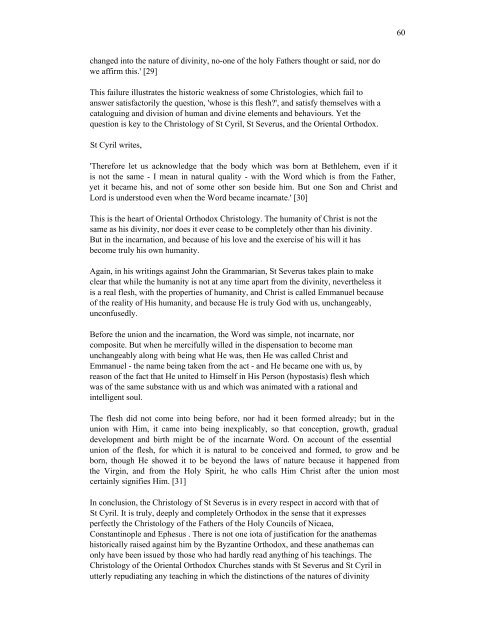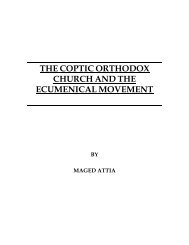Coptic interpretations of the Fourth Ecumenical Council - Saint Mina ...
Coptic interpretations of the Fourth Ecumenical Council - Saint Mina ...
Coptic interpretations of the Fourth Ecumenical Council - Saint Mina ...
Create successful ePaper yourself
Turn your PDF publications into a flip-book with our unique Google optimized e-Paper software.
changed into <strong>the</strong> nature <strong>of</strong> divinity, no-one <strong>of</strong> <strong>the</strong> holy Fa<strong>the</strong>rs thought or said, nor do<br />
we affirm this.' [29]<br />
This failure illustrates <strong>the</strong> historic weakness <strong>of</strong> some Christologies, which fail to<br />
answer satisfactorily <strong>the</strong> question, 'whose is this flesh?', and satisfy <strong>the</strong>mselves with a<br />
cataloguing and division <strong>of</strong> human and divine elements and behaviours. Yet <strong>the</strong><br />
question is key to <strong>the</strong> Christology <strong>of</strong> St Cyril, St Severus, and <strong>the</strong> Oriental Orthodox.<br />
St Cyril writes,<br />
'Therefore let us acknowledge that <strong>the</strong> body which was born at Bethlehem, even if it<br />
is not <strong>the</strong> same - I mean in natural quality - with <strong>the</strong> Word which is from <strong>the</strong> Fa<strong>the</strong>r,<br />
yet it became his, and not <strong>of</strong> some o<strong>the</strong>r son beside him. But one Son and Christ and<br />
Lord is understood even when <strong>the</strong> Word became incarnate.' [30]<br />
This is <strong>the</strong> heart <strong>of</strong> Oriental Orthodox Christology. The humanity <strong>of</strong> Christ is not <strong>the</strong><br />
same as his divinity, nor does it ever cease to be completely o<strong>the</strong>r than his divinity.<br />
But in <strong>the</strong> incarnation, and because <strong>of</strong> his love and <strong>the</strong> exercise <strong>of</strong> his will it has<br />
become truly his own humanity.<br />
Again, in his writings against John <strong>the</strong> Grammarian, St Severus takes plain to make<br />
clear that while <strong>the</strong> humanity is not at any time apart from <strong>the</strong> divinity, never<strong>the</strong>less it<br />
is a real flesh, with <strong>the</strong> properties <strong>of</strong> humanity, and Christ is called Emmanuel because<br />
<strong>of</strong> <strong>the</strong> reality <strong>of</strong> His humanity, and because He is truly God with us, unchangeably,<br />
unconfusedly.<br />
Before <strong>the</strong> union and <strong>the</strong> incarnation, <strong>the</strong> Word was simple, not incarnate, nor<br />
composite. But when he mercifully willed in <strong>the</strong> dispensation to become man<br />
unchangeably along with being what He was, <strong>the</strong>n He was called Christ and<br />
Emmanuel - <strong>the</strong> name being taken from <strong>the</strong> act - and He became one with us, by<br />
reason <strong>of</strong> <strong>the</strong> fact that He united to Himself in His Person (hypostasis) flesh which<br />
was <strong>of</strong> <strong>the</strong> same substance with us and which was animated with a rational and<br />
intelligent soul.<br />
The flesh did not come into being before, nor had it been formed already; but in <strong>the</strong><br />
union with Him, it came into being inexplicably, so that conception, growth, gradual<br />
development and birth might be <strong>of</strong> <strong>the</strong> incarnate Word. On account <strong>of</strong> <strong>the</strong> essential<br />
union <strong>of</strong> <strong>the</strong> flesh, for which it is natural to be conceived and formed, to grow and be<br />
born, though He showed it to be beyond <strong>the</strong> laws <strong>of</strong> nature because it happened from<br />
<strong>the</strong> Virgin, and from <strong>the</strong> Holy Spirit, he who calls Him Christ after <strong>the</strong> union most<br />
certainly signifies Him. [31]<br />
In conclusion, <strong>the</strong> Christology <strong>of</strong> St Severus is in every respect in accord with that <strong>of</strong><br />
St Cyril. It is truly, deeply and completely Orthodox in <strong>the</strong> sense that it expresses<br />
perfectly <strong>the</strong> Christology <strong>of</strong> <strong>the</strong> Fa<strong>the</strong>rs <strong>of</strong> <strong>the</strong> Holy <strong>Council</strong>s <strong>of</strong> Nicaea,<br />
Constantinople and Ephesus . There is not one iota <strong>of</strong> justification for <strong>the</strong> ana<strong>the</strong>mas<br />
historically raised against him by <strong>the</strong> Byzantine Orthodox, and <strong>the</strong>se ana<strong>the</strong>mas can<br />
only have been issued by those who had hardly read anything <strong>of</strong> his teachings. The<br />
Christology <strong>of</strong> <strong>the</strong> Oriental Orthodox Churches stands with St Severus and St Cyril in<br />
utterly repudiating any teaching in which <strong>the</strong> distinctions <strong>of</strong> <strong>the</strong> natures <strong>of</strong> divinity<br />
60








